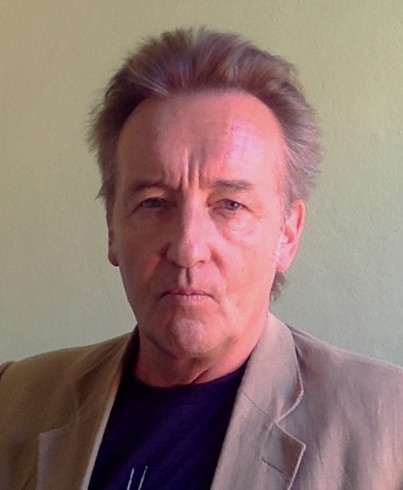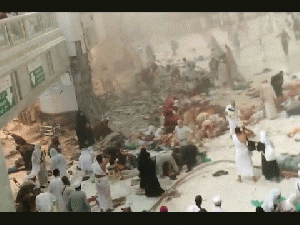Reprinted from Sputnik
Worshippers were gathering in the top mosque at Mecca for Friday evening prayers when one of the construction cranes foresting the holy city toppled, crashing through the roof and crushing hundreds of people below. Blood-splattered corpses lay strewn across the floor of the mosque, as shell-shocked survivors struggled to make sense of the freak disaster. Apparently, heavy rain and gusts of wind had caused the metallic structure to keel over.
The incident comes as nearly two million Muslims from across the globe are due to gather in Mecca during the next two weeks for the annual Hajj pilgrimage. Mecca -- reputed to be the birthplace of the Prophet Mohammed -- is undergoing extensive property development. Some critics have accused the Saudi authorities of exploiting the unique spiritual status of the city in order to make way for expensive apartments and hotels to generate lucrative tourism profits.
Among the construction companies to have secured juicy contracts are firms owned by the ruling House of Saud. There are strong suspicions of cronyism and bribery plying the construction boom in Mecca. This has in turn led to lax regulation in safety standards and building controls. The use of cheap unskilled labor from the Indian subcontinent is also a factor.
Mecca and the other Saudi city Medina associated with the Prophet are considered the two holiest Muslim sites on Earth. Saudi King Salman, as for his predecessors, is referred to formally as "the custodian of the two holiest sites of Islam," as well as being the sovereign leader of Saudi Arabia.
Nevertheless, for many Muslims around the world, the House of Saud is seen as a disgrace to Islam. In recent years, the Saudi rulers are heavily implicated in sowing sectarian violence between Sunni and Shia branches of the faithful across the entire region. The House of Saud professes a fundamentalist version of Sunni Islam known as Wahhabism, which views others Muslim sects with disdain as somehow being "apostate" or "infidel."
The Saudi regime is known to have funnelled billions of dollars and weapons into these terror networks as proxies for pursuing its geopolitical schemes. Iran -- seen as a "heretic" Shia power -- is the recurring bane of Saudi obsession.
Washington and the other Western powers, including the Israeli regime, are fully supportive of the House of Saud and the related Gulf monarchies in Kuwait, Bahrain, Qatar, the United Arab Emirates and Oman. These family-run oil-rich entities are armed to the teeth by the US, Britain, France and Germany -- making them among the most repressive autocrats on earth.
The terror links of the Saudis and other Gulf Arab dictators is not an impediment to Western alliance with these despots. Far from it.
The evidence shows that the Western powers -- despite their bombastic claims of fighting terrorism -- have in fact colluded all the way with the Gulf monarchies to use these same terror groups as proxies in their shared geopolitical agenda of regime change in the Middle East.
The same criminal conspiracy is seen to even greater extent in Yemen. For the past six months, the Arabian Peninsula country has been bombed on a daily basis by a so-called coalition headed up by Saudi Arabia and the other Gulf despots. America and Britain are supplying the warplanes and munitions, as well as aerial coordination, for this war of aggression.
The Western-Arab military intervention has no mandate from the UN Security Council.
The only "mandate" it has is from their deposed and discredited former puppet president Mansour Hadi.
In targeting Yemen, the Western-Saudi coalition has spared no-one and nothing. Residential homes, hospitals, schools, water and power utilities, markets and mosques have been bombed, with a civilian death toll well over 5,000. Even humanitarian aid convoys have been hit. The head of the UN's High Commission for Refugees, Antoine Grand, told the BBC that two of his staff were killed last week in a "deliberate" Saudi air strike on their convoy.
Over the weekend, 10 Yemeni civilians were reportedly killed when a village in the southern province of Taiz was bombed by Saudi warplanes. Meanwhile, in the capital Sanaa, innumerable casualties were feared after dozens of poor residential neighborhoods were hit by airstrikes.
(Note: You can view every article as one long page if you sign up as an Advocate Member, or higher).






